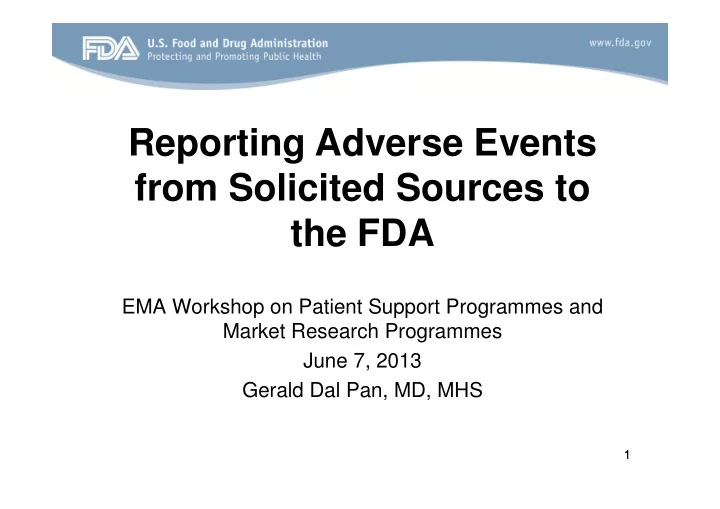

Reporting Adverse Events from Solicited Sources to the FDA EMA Workshop on Patient Support Programmes and Market Research Programmes June 7, 2013 Gerald Dal Pan, MD, MHS 1
FDA Regulations and Guidances • There are no FDA regulations specific to reporting from solicited sources such as patient support programs (PSPs), etc. • FDA regulations distinguish between spontaneously reported adverse events (AEs) and AEs from postmarket studies • This regulatory framework does not adequately capture PSPs, etc. • In FDA guidances to industry, we use the term “solicited,” which is intended to cover PSPs and similar sources of safety information where there is planned contact between the applicant and patient. 2
Regulatory requirements for spontaneous versus study reports Spontaneously reported AEs 314.80(c)(1)(i) Postmarketing 15-day "Alert reports". The applicant shall report each adverse drug experience that is both serious and unexpected, whether foreign or domestic, as soon as possible but in no case later than 15 calendar days of initial receipt of the information by the applicant. 314.80(c)(1)(ii) Postmarketing 15-day "Alert reports"--followup. 314.80(c)(2)(ii)(b) Non-expedited case reports are required to be submitted quarterly for the first three years post-approval and annually thereafter AEs from postmarket studies 314.80(e) Postmarketing studies. An applicant is not required to submit a 15- day Alert report under paragraph (c) of this section for an adverse drug experience obtained from a postmarketing study (whether or not conducted under an investigational new drug application) unless the applicant concludes that there is a reasonable possibility that the drug caused the adverse experience. 3
What our FDA guidances to industry say on reporting from solicited sources • 1992 Guideline for Postmarketing Reporting of Adverse Drug Experiences • 1997 Guidance for Industry: Postmarketing Adverse Experience Reporting for Human Drug and Licensed Biological Products: Clarification of What to Report • 2001 Draft Guidance for Industry: Postmarketing Safety Reporting for Human Drug and Biological Products Including Vaccines 4
1992 Final Guidance Section VI.b. Postmarketing, clinical trials, or surveillance study of drugs involving ADE monitoring “A study refers to a formal research effort including a protocol with specific objectives and a scientific methodology for collecting and analyzing ADE data. Anything less rigorous should be treated as a spontaneous report…Postmarketing, clinical trials, and surveillance studies as described in this section and under 310.305 and 314.80(e) refer to studies specifically monitoring the adverse effects of the drug. Adverse events incidental to other types of studies should be treated as spontaneous.” The 1992 guidance does not discuss “solicited” sources explicitly. Instead, it states there are two categories of sources: (1) study or study-like and (2) non-study. It implies that reports from a solicited source that is not set up like a study should be treated as spontaneously reported cases. A PSP such as a reimbursement program would therefore we considered “spontaneous.” 5
1997 Clarification Guidance Section III. INDIVIDUAL CASE REPORTS BASED ON SOLICITED INFORMATION “The FDA has determined, for purposes of postmarketing safety reporting under 21 CFR 310.305, 314.80, 314.98, and 600.80, that information concerning potential adverse experiences derived during planned contacts and active solicitation of information from patients (e.g., company sponsored patient support programs, disease management programs) should be handled as safety information obtained from a postmarketing study. Applicants, manufacturers, and licensed manufacturers should not report safety information obtained through these types of patient contacts unless the adverse event meets the regulatory definitions of serious and unexpected and there is a reasonable possibility that the drug or biological product caused the adverse experience.” 6
2001 Draft Guidance • The 2001 draft guidance contains information similar to what is found in the 1992 and 1997 guidances. • Section VI.B. Postmarketing, Clinical Trial, or Surveillance Studies “…a study refers to the systematic collection of data involving solicitation of adverse experience information (e.g., derived from a clinical trial, patient registry). Adverse experiences incidental to other types of studies not involving monitoring adverse experiences of products should be treated as spontaneous reports. For purposes of safety reporting, reports of suspected adverse experiences obtained from company sponsored patient support programs and disease management programs should be handled as if they were study reports and not as spontaneous reports.” 7
Questions? Please contact the Regulatory Affairs Staff in the Office of Surveillance and Epidemiology at: CDER-OSE-PMKTREGS@fda.hhs.gov 8
Recommend
More recommend